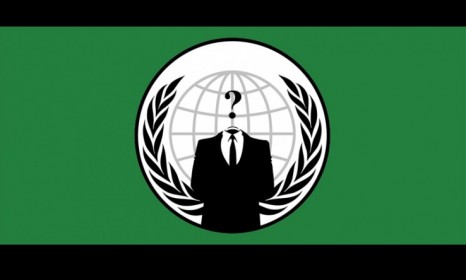Anonymous: The secret group's 5 biggest hacks
The web's most notorious mischief-makers hobble corporations and right-wing groups alike. Here are their greatest hits

Anonymous, the shadowy group of hackers that grew out of an anarchic message board on the website 4Chan, has made headlines quite a bit in recent months. The loosely organized group of "hacktivists," which typically aligns itself with liberal causes, has brought down the websites of Visa, PayPal, and the Westboro Baptist Church. Here are their five biggest targets... so far:
1. Westboro Baptist Church
After a February letter threatening to hack the widely loathed church's site was revealed to be a hoax, Westboro played the role of defiant victim, inviting Anonymous to "bring it." Days later, Anonymous hacked into Westboro's website. "Take this defacement as a simple warning: go away," they wrote. "The world (including Anonymous) disagrees with your hateful messages." There's a "lesson to be learned" here, says Tony Bradley at PCWorld. "When your supporters can be counted on your fingers, and your enemies outnumber the population of China, it is unwise to brazenly invite attack."
The Week
Escape your echo chamber. Get the facts behind the news, plus analysis from multiple perspectives.

Sign up for The Week's Free Newsletters
From our morning news briefing to a weekly Good News Newsletter, get the best of The Week delivered directly to your inbox.
From our morning news briefing to a weekly Good News Newsletter, get the best of The Week delivered directly to your inbox.
2. The Koch brothers
Most recently, Anonymous went after the Koch brothers — the billionaire conservatives and prominent Tea Party backers — by launching a denial-of-service attack on the website of their advocacy group, Americans for Prosperity. Anonymous claimed that "Koch Industries, and oligarchs like them, have...started to manipulate the political agenda in Wisconsin." It's quite "unusual for Anonymous to take on such a blatantly political operation," says Adrian Chen at Gawker. But Anonymous says the attack is about unchecked corporate power. The hacker collective is now "actively probing" Koch-owned company websites for weaknesses — something that should make executives at those corporations "very nervous," says Byron Acohido at USA Today.
3. The Church of Scientology
Anonymous made its name in 2008, when it declared war on Scientology. After Gawker posted a notorious video of celebrity Scientologist Tom Cruise, Anonymous posted a video of its own, declaring that "the extent of your malign influence over those who trust you as leaders has been made clear to us. Anonymous has therefore decided that your organization should be destroyed." It launched an elaborate disruption program called Project Chanology, which encouraged people to spam the church with emails and phone calls and bring down its website with denial-of-service attacks.
A free daily email with the biggest news stories of the day – and the best features from TheWeek.com
4. WikiLeaks' foes
In 2010, Anonymous mounted "Operation Payback," a wide-ranging effort to punish pro-copyright groups that had cracked down on Internet piracy. In December, the initiative expanded to include companies and individuals who had come out against WikiLeaks and its founder, Julian Assange. When MasterCard ceased processing payments connected to WikiLeaks, Anonymous crippled the company's websites with denial-of-service attacks. Visa, PayPal, and the website of Assange critic Sen. Joe Lieberman (I-Conn.) suffered the same fate. On its website, one Anonymous member explained that the group isn't affiliated with WikiLeaks, but fights for the same reasons: "We want transparency and we counter censorship. The attempts to silence WikiLeaks are long strides closer to a world where we can not say what we think and are unable to express our opinions and ideas."
5. A bigshot cyber-security executive
In perhaps its biggest coup to date, Anonymous directly caused the resignation of the chief executive of a U.S. security firm that was helping the government track down cyberactivists. Aaron Barr, who headed HBGary Federal, had boasted to the Financial Times that he would reveal the names of some of Anonymous's leaders. The group responded by hacking into HBGary's computer system through its public website, accessing 71,000 private emails, and indexing them in a searchable format for anyone to read. The emails revealed an institution that was comfortable employing dirty tricks to preserve its image. Last week, congressional Democrats demanded an investigation into HBGary. On Feb. 28, Barr was forced to resign.


